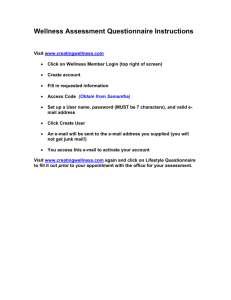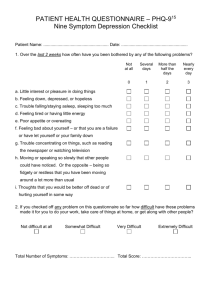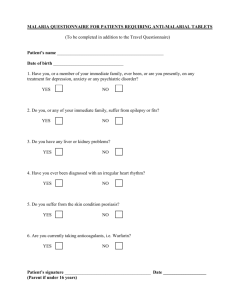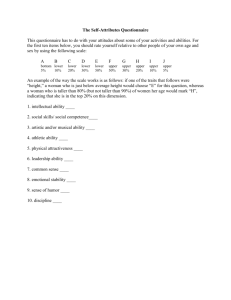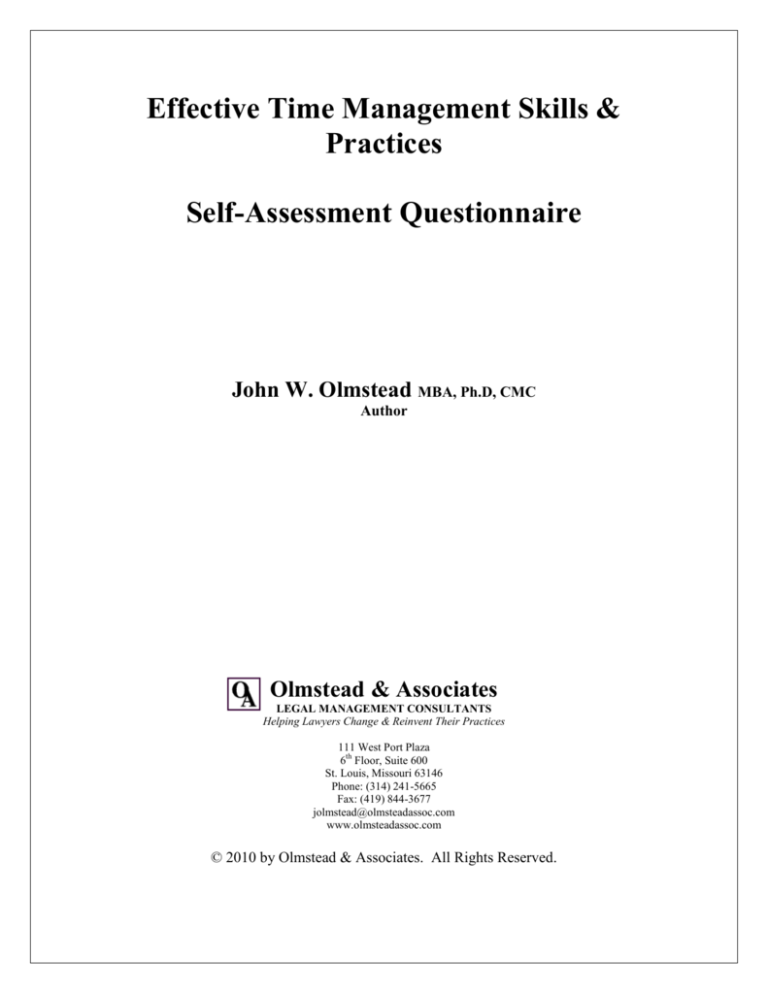
Effective Time Management Skills &
Practices
Self-Assessment Questionnaire
John W. Olmstead MBA, Ph.D, CMC
Author
Olmstead & Associates
LEGAL MANAGEMENT CONSULTANTS
Helping Lawyers Change & Reinvent Their Practices
111 West Port Plaza
6th Floor, Suite 600
St. Louis, Missouri 63146
Phone: (314) 241-5665
Fax: (419) 844-3677
jolmstead@olmsteadassoc.com
www.olmsteadassoc.com
© 2010 by Olmstead & Associates. All Rights Reserved.
How to Use the Time Management Self-Assessment Questionnaire
Learning to manage your time effectively is much more difficult than many imagine. It
requires conscientious efforts at developing new work skills and awareness of time as a
valuable resource. This self-assessment questionnaire is designed as a tool for identifying
your current time management skills, habits, and practices. Use it periodically as a selfcheck. If you are daring, you might ask a co-worker to rate you on many of these items,
their perceptions might help you identify areas you didn’t realize needed attention.
The Time Management Self-Assessment Questionnaire is a self-assessment tool is
designed to be used by professionals, management and staff to assess how well you
manage your time and deal with the following:
Timewasters
-
Telephone
Drop in visitors
Meetings
Procrastination
Indecision
Paperwork
Other people’s priorities
Firefighting (crisis and priority management)
Being organized
Delegation.
Effective management of these areas is key to effective time management. Your present
time management skill can be determined by completing the Time Management SelfAssessment Questionnaire.
The Time Management Self-Assessment Questionnaire is designed to be completed by
all personnel in the firm. The following sequence of activities is recommended:
Take 10 minutes of uninterrupted time to complete the self-assessment questionnaire.
Complete the self-assessment questionnaire.
Take notes and note ideas and improvement areas as you complete the questionnaire.
Prepare an action plan with completion timetables identified. Self-accountability
should be designed into the plan.
Implement the plan.
Appoint someone with nagging rights to help keep you on track. Hire a coach if
necessary.
Follow-up and review.
2
Time Management Self-Assessment Questionnaire
Questionnaire Completion Instructions
This self-assessment questionnaire rates you in various skill areas considered required for
effective time management. These skill areas are key to developing “best practice” time
management habits and practices.
Rate the yourself on the following scale by assigning a numerical rating according to the
following key:
1 – Never
2 – Seldom
3 – Sometimes
4 – Most of the Time
5 – Always
Rate Yourself On The Following Scale
General Practices
1. I am continually conscious that time is my most critical resource.
1 2 3 4 5
2. I know what habits I have that keep me from using my time
effectively.
1 2 3 4 5
3. I have clearly written out lifetime and one to three year goals
1 2 3 4 5
4. I use a formal system for organizing a weekly work plan.
1 2 3 4 5
5. I make a fresh new “to do” list each workday.
1 2 3 4 5
6. I place a priority code next to all items on my daily “to do” list.
1 2 3 4 5
7. I set my priorities according to their importance, not their urgency.
1 2 3 4 5
6. I know my prime work times.
1 2 3 4 5
7. I use my prime work times to complete important tasks.
1 2 3 4 5
8. I have an effective system for incorporating items from my
lifetime, and one to three year goal list into my daily work tasks.
1 2 3 4 5
9. I am conscious of my true reasons for procrastination.
1 2 3 4 5
3
10. I know when I am avoiding tasks out of fear.
1 2 3 4 5
11. I use effective techniques for completing tasks on which I am
procrastinating.
1 2 3 4 5
12. I give my undivided attention to one task at a time.
1 2 3 4 5
13. I seek quality work, but not perfection.
1 2 3 4 5
14. I create due dates for tasks which don’t have predetermined
deadlines.
1 2 3 4 5
15. I avoid meetings that are time wasters.
1 2 3 4 5
16. I make constructive use of meeting times, insuring that
follow-up assignments are clear.
1 2 3 4 5
17. I utilize effective techniques for saying “no” to excessive
requests on my time.
1 2 3 4 5
18. I keep interruptions on my work to a minimum.
1 2 3 4 5
19. I regularly schedule a quiet time into each workday.
1 2 3 4 5
20. I control the telephone, it does not control me.
1 2 3 4 5
21. My desk is clear of clutter and visual distractions.
1 2 3 4 5
22. I avoid excessive social encounters when at work.
1 2 3 4 5
23. I know when I am diverting myself from my top priorities.
1 2 3 4 5
24. My files are accurate.
1 2 3 4 5
25. My files are accessible.
1 2 3 4 5
26. My files are current.
1 2 3 4 5
27. My files are streamlined.
1 2 3 4 5
28. I have a system in place to monitor and reduce crisis.
1 2 3 4 5
29. I use breaks creatively when fatigued on a given task.
1 2 3 4 5
30. I focus on results, not the amount of work generated.
1 2 3 4 5
4
31. I periodically use a time log.
1 2 3 4 5
32. I enter my timesheets into a time billing program.
1 2 3 4 5
33. I track both billable and non-billable time in the billing system.
1 2 3 4 5
34. I set goals for billable and non-billable hours.
1 2 3 4 5
35. I use specific techniques for keeping paperwork under control.
1 2 3 4 5
36. I make appointments with the file in order to get the work done
at a specific time without interruption.
1 2 3 4 5
37. I have a fixed time each morning or at the end of the day when I
meet with my assistant to plan and coordinate the day (or next
day’s) work.
1 2 3 4 5
38. I have a system or process in place to automate, as much as
possible, tasks such as engagement letters, proposals, responses
to re request for proposal, billing review, etc.
1 2 3 4 5
39. I use an automated document management system.
1 2 3 4 5
40. I use a case/project management system.
1 2 3 4 5
41. I use an automated document assembly system.
1 2 3 4 5
42. I use dictating equipment effectively.
1 2 3 4 5
43. I use a proper balance between computer and dictating equipment.
1 2 3 4 5
44. I and not others control my time.
1 2 3 4 5
Delegation
45. I delegate tasks whenever possible.
1 2 3 4 5
46. I delegate challenging tasks.
1 2 3 4 5
47. I am no longer doing pet projects. I left them behind when I was
when I was promoted.
1 2 3 4 5
48. I prefer to teach others how to do the job rather than do the job
myself.
1 2 3 4 5
5
49. I fully empower subordinates and I do not attend to assignments
that others are supposed to do.
1 2 3 4 5
50. I am not concerned about someone else taking my job from me.
1 2 3 4 5
51. I have no problem communicating exactly what I expect to be done
with a delegated task.
1 2 3 4 5
52. I am not carrying home an increasingly larger amount of work.
1 2 3 4 5
53. I do not feel overwhelmed with work when I return from vacation.
1 2 3 4 5
Average Score (Add up the numeric score on each response and
and divide by 53._____________
1 2 3 4 5
6
ACTION PLAN
No.
Action Item Description
Responsibility
7
Deadline





